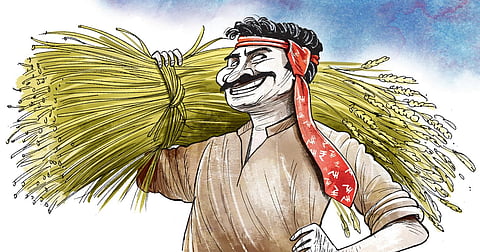

Recently Tamil Nadu became the first Indian state to introduce a law governing contract farming practice. The law has been drafted based on the Model Contract Farming Act, namely “The … State/UT Agricultural Produce and Livestock Contract Farming and Services (Promotion & Facilitation) Act 2018” released by the Centre in May 2018. The Model Act was circulated to the states for their implementation. Other states such as Goa, Karnataka, Odisha and Uttar Pradesh are reported to have started working on their contract farming laws.
The contract farming system involves linking farmers with a known buyer (e.g., agribusiness firm) through a forward contract in which the former promises to supply certain quantity of an agricultural product to the latter within a pre-agreed time frame subject to mutually agreed conditions. Thanks to the support provided by the buyer as part of the contract, the system has the potential to solve problems faced by Indian farmers. They include low crop yield, price and market uncertainty, inadequate access to inputs, technology and credit, high transportation costs and low returns. Besides, the system aids the growth of the food processing industry and integration of farmers into the agricultural value chain.
Despite its worldwide acceptance, the practice is yet to gain higher acceptability in India. This is mainly due to the cautious approach of state governments. They are concerned about the negative fallout of adopting the system. The key concerns are exclusion of small and marginal farmers on the grounds of attaining economies of scale, dominance of buyers in decision-making, payment delays to farmers, rejection of produce for quality reasons, and uncertainty over honouring the contract and its legal enforcement. An ideal way to tackle these concerns is to put in place a practical regulatory framework aimed at safeguarding the interests of the farmers and buyers. The release of the Model Act and TN’s follow-up action assumes greater significance in this context. The Act contains various provisions to address the concerns relating to the adoption of the contract farming system.
To start with, the Act proposes setting up an official agency for effective implementation of its various provisions. This is a welcome step as currently there is no formal mechanism to oversee and facilitate the system’s working. Over 80% of agricultural households in India are those of small and marginal farmers owning up to five acres of land. This is a significant constraint for adopting the practice as buyers would prefer to engage with farmers having large parcels of land. One viable solution to overcome this is to pool the plots of land owned by small farmers and engage with the buyers collectively. This would not only create a scale effect but also enhance farmers’ bargaining position. The Act has opened the avenue for such collective engagement among small farmers with a provision to promote Farmer Producer Organisations.
To prevent the dominance of buyers in the contractual arrangement the Model Act (a) provides farmers the power to fix prices for the product together with buyers and an option to enter into contracts with multiple buyers for a minimum of one crop cycle, (b) requires the use of only electronic machines for weighing of produce and (c) encourages forming a Contract Farming Facilitation Group (CFFG) at the village/panchayat level to facilitate activities relating to contract farming.
Rejection of contracted produce by buyers citing quality reasons is a prevalent problem in this arrangement. To tackle it, the Model Act vests the power to devise quality standards in the official agency by engaging experts or on its own. Alternatively, the Act empowers the contracting parties to formulate quality standards on their own or follow established standards or seek a quality assayer’s help. The delay in settlement of payment to farmers is proposed to be tacked through payment via banks or electronic clearance on the same day, or the next day of product delivery or on a day mutually agreed. In case of default, a penal interest would be levied on the buyer for up to 30 days. Any delay beyond it would be recovered from the buyer as arrears from land revenue. If the product quality can be assessed only later, the Act stipulates that two-thirds of the payment should be made on the date of delivery or a mutually agreeable date.
Contract enforcement is a significant challenge for the system as both parties might breach it due to varied reasons. As per the Model Act, a party breaching a contract is liable to pay compensation in the form of arrears of land revenue. Yet, by mutual consent, parties can modify the contract terms and terminate it. To make matters easier for farmers, the Act warrants the signing of a written contract drafted in the local language. It also requires the official agency to bring together farmers and buyers for discussing and resolving issues emerging from the contract. It proposes a multi-layer dispute resolution mechanism, which includes negotiation by parties personally, alternative dispute resolution mechanisms, dispute settlement authority with the power of a civil court, and an opportunity to challenge the authority’s verdict.
Studies across the world, by and large, prove that contract farming practices improve farmers’ welfare. The Model Act provides a viable regulatory architecture for the hassle-free functioning of the system by balancing the interests of both farmers and buyers. Interestingly, many important provisions in the Act are in conformity with similar laws in countries such as the US, France, Spain, Belgium, Brazil, Argentina, Cambodia, Mozambique and Morocco. Hence, it deserves a chance to be implemented. TN has led the way. Now, it is time for other states to follow its example.
(Deva Prasad M, Assistant Professor at IIM Kozhikode, also contributed to the article)
Sthanu R Nair
Associate Professor of Economics at IIM Kozhikode
Email: srn@iimk.ac.in
Sai Shiva Jayanth Reddy
Research scholar at
IIM Kozhikode